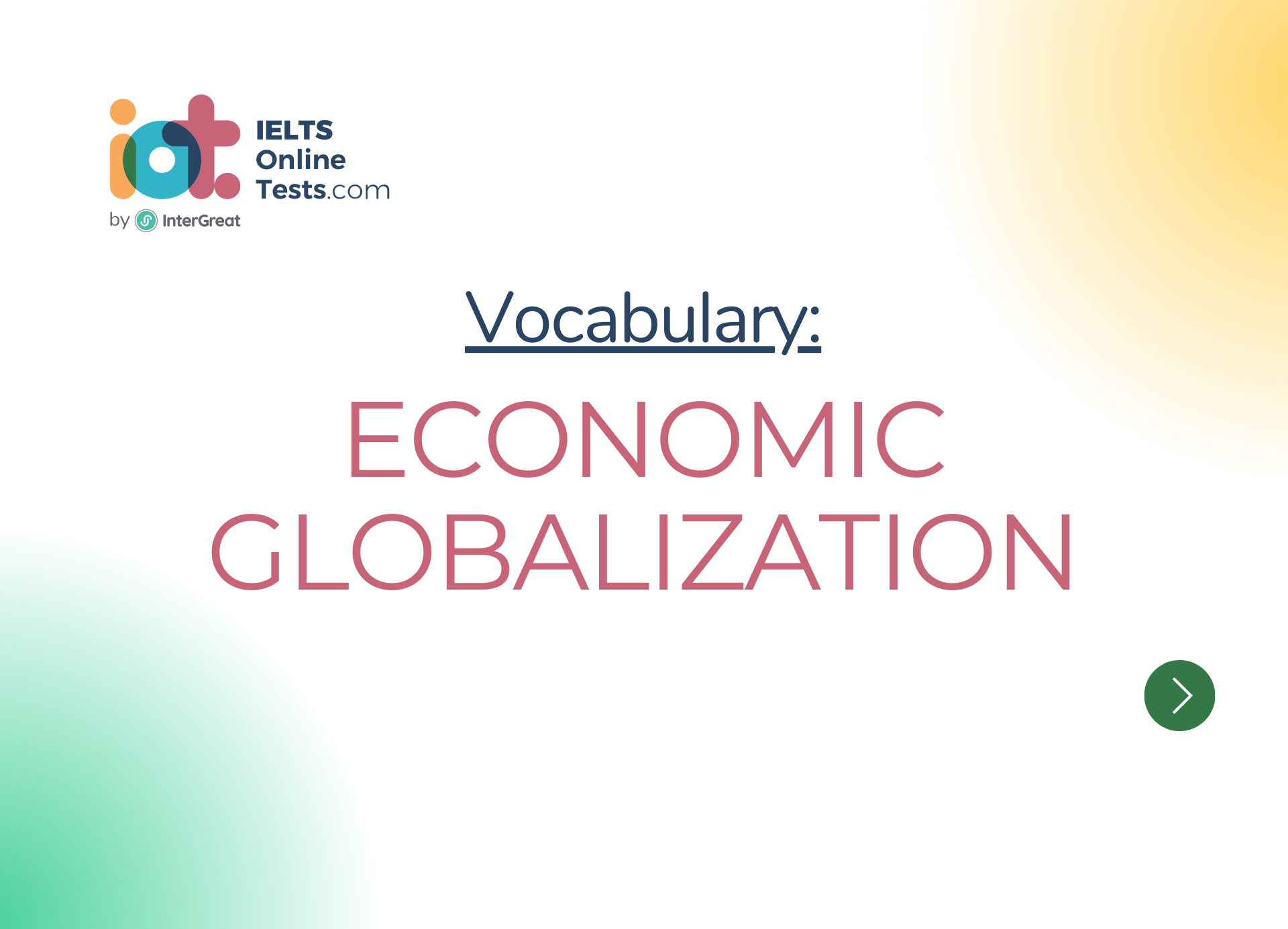
Economic globalization
Here are some vocabulary words related to economic globalization for IELTS band scores 4.5-6.0:
Globalization:
The process of increased interconnectedness and interdependence among countries through the exchange of goods, services, information, and ideas.
International Trade:
The exchange of goods and services across national borders.
Outsourcing:
The practice of hiring external companies or individuals to perform specific tasks or provide services instead of using in-house resources.
Offshoring:
The relocation of business activities or production processes to another country to take advantage of lower costs or resources.
Foreign Investment:
Investment made by individuals, companies, or governments in businesses or assets located in foreign countries.
Multinational Corporation (MNC):
A company that operates in multiple countries and has assets or business activities in more than one nation.
Free Trade:
The unrestricted movement of goods and services between countries without tariffs or other trade barriers.
Trade Liberalization:
The removal or reduction of barriers to international trade to promote economic integration.
Trade Agreements:
Formal treaties between countries that reduce barriers to trade and facilitate the exchange of goods and services.
Trade Surplus:
When a country's exports exceed its imports.
Trade Deficit:
When a country's imports exceed its exports.
Global Supply Chain:
The network of companies and activities involved in producing, distributing, and selling goods on a global scale.
Tariffs:
Taxes or duties imposed on imported goods, making them more expensive for consumers.
Trade Bloc:
A group of countries that agree to reduce or eliminate trade barriers among themselves.
Foreign Direct Investment (FDI):
Investment made by a company in one country into a business in another country.
World Bank:
An international financial institution that provides loans and grants to the governments of low and middle-income countries for development projects.
International Monetary Fund (IMF):
An organization that provides financial assistance and economic advice to member countries facing balance of payments problems.
Global Economic Integration:
The process of countries becoming more economically connected through trade, investment, and financial flows.
Cultural Homogenization:
The process by which cultures become more similar as a result of globalization and the spread of cultural products and values.
Sustainable Development:
Development that meets the needs of the present without compromising the ability of future generations to meet their own needs.
Income Inequality:
The unequal distribution of income among individuals or households within a country or globally.
Labor Mobility:
The movement of workers between countries in search of employment opportunities.
Digital Economy:
The part of the economy that is based on digital technologies and includes e-commerce, online services, and digital products.
Global Competitiveness:
The ability of a country or company to compete effectively in the global market.
Global Economic Crisis:
A severe downturn in the global economy, often characterized by financial instability, unemployment, and decreased trade and investment.
Trade Protectionism:
Policies implemented by governments to restrict imports and protect domestic industries from foreign competition.
Currency Exchange Rate:
The value of one country's currency relative to another's, which determines the cost of foreign goods and services.
Foreign Aid:
Financial assistance, technical support, or resources provided by one country to another for development or humanitarian purposes.
Bilateral Trade:
Trade between two countries.
Multilateral Trade:
Trade between multiple countries, often facilitated by international organizations like the World Trade Organization (WTO).
Intellectual Property Rights:
Legal rights that protect the creations of inventors, authors, and artists, such as patents, copyrights, and trademarks.
Global Sourcing:
The practice of businesses seeking the most cost-effective locations for goods, services, and labor around the world.
Outward Foreign Direct Investment:
Investments made by companies from one country into businesses located in other countries.
Inward Foreign Direct Investment:
Investments made by foreign companies into businesses located in a particular country.
Balance of Trade:
The difference between the value of a country's exports and imports over a specific period.
Economic Integration:
The process of reducing trade barriers and increasing economic cooperation between countries.
Remittances:
Money sent by migrants working in other countries back to their home countries.
Trade Imbalance:
When a country's imports and exports are not in equilibrium, leading to a trade deficit or surplus.
Trade Negotiations:
Diplomatic discussions between countries aimed at reaching agreements on trade issues.
Global Economic Governance:
Mechanisms and institutions that regulate and govern international economic relations.
Remember to practice using these vocabulary words in various contexts to improve your understanding and fluency. This will not only help you with the IELTS exam but also enhance your ability to discuss economic globalization and related topics. Good luck with your studies!




